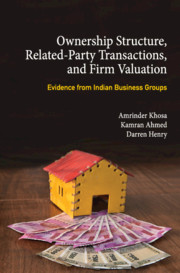 Ownership Structure, Related Party Transactions, and Firm Valuation
Ownership Structure, Related Party Transactions, and Firm Valuation Book contents
- Frontmatter
- Contents
- List of Tables
- 1 Introduction
- 2 The Evolution of Business Groups, Institutional Framework in India, and Related-Party Transactions
- 3 Theory and Literature Review
- 4 Hypotheses Development
- 5 Research Methods
- 6 Descriptive Statistics
- 7 Empirical Results
- 8 Additional Tests
- 9 Implications of the Study and Conclusion
- Appendix 1 List of Sample Firms
- Appendix 2 List of Business Groups
- References
- Index
2 - The Evolution of Business Groups, Institutional Framework in India, and Related-Party Transactions
Published online by Cambridge University Press: 26 April 2019
- Frontmatter
- Contents
- List of Tables
- 1 Introduction
- 2 The Evolution of Business Groups, Institutional Framework in India, and Related-Party Transactions
- 3 Theory and Literature Review
- 4 Hypotheses Development
- 5 Research Methods
- 6 Descriptive Statistics
- 7 Empirical Results
- 8 Additional Tests
- 9 Implications of the Study and Conclusion
- Appendix 1 List of Sample Firms
- Appendix 2 List of Business Groups
- References
- Index
Summary
Introduction
This chapter provides the background on the evolution of business groups and the institutional framework in India. It begins by discussing family control of business groups, followed by the facts on the evolution and transformation of these business groups. The next section looks at the Indian economy, while the fourth section provides information on the accounting standard setting process in India. The fifth section draws attention to the weak enforcement system in India, which is followed by a discussion on the rules pertaining to RPTs. The last section summarizes the main themes outlined in the chapter.
Family control
Chua, Chrisman, and Sharma (1999, 25) define a family business as ‘a business governed or/and managed on a sustainable, potentially cross-generational, basis to shape and perhaps pursue the formal or implicit vision of the business held by members of the same family or a small number of families.’
Most Indian business groups started as family businesses. They moved aggressively after Independence in 1947 and their operations became well diversified. For instance, the Birla group was established by Seth Shiv Narayan Birla in 1870 as a small cotton and jute trading business. Over the years, the group has diversified its operations into petrochemicals, textiles, telecommunications, cement, automobiles, and financial services, and the group now consists of more than 40 companies. Although each firm within the group is a separate legal entity, control still resides with the promoter families. In the case of the Birla group, Kumar Mangalam Birla, the only son of Aditya Birla, is the current chairman. Considering the nature of these business groups (family controlled), the literature on family firms would be relevant to examine the attributes of Indian business groups. The terms ‘business groups’ and ‘family firms’ will be used interchangeably in this study. Khanna and Yafeh (2007) identify that groups are generally family firms and their behaviour can be understood better from this perspective.
The literature on property rights suggests that the legal system shapes the structure of property rights. Fan and Wong (2002) view share ownership rights as property rights, with shareholders being entitled to certain rights. First, the shareholder has control rights. Second, the shareholder has cash-flow rights, and finally, the right to transfer the shares. The value of the shares depends on the enforcement of such rights. The enforcement is undertaken by the owner and the state (Fan and Wong, 2002).
- Type
- Chapter
- Information
- Ownership Structure, Related Party Transactions, and Firm ValuationEvidence from Indian Business Groups, pp. 10 - 26Publisher: Cambridge University PressPrint publication year: 2019
- 1
- Cited by


